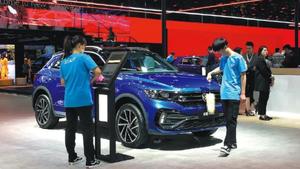 FAW-Volkswagen's T-Roc model is displayed at the Guangzhou auto show last year. (LI FUSHENG / CHINA DAILY)
FAW-Volkswagen's T-Roc model is displayed at the Guangzhou auto show last year. (LI FUSHENG / CHINA DAILY)
The China Association of Automobile Manufacturers is calling on authorities to launch a slew of favorable policies that include extending the term of subsidies for new energy vehicles to boost the country's slowing car sales.
"Without favorable policies and market demand, it will be difficult for the automotive industry to steer back to normal in a short time," said Shi Jianhua, the association's deputy secretary-general, on Thursday.
Due to the coronavirus outbreak which has kept people away from showrooms, vehicle sales in February slumped 79 percent from the same month in 2019 to 310,000.
Without favorable policies and market demand, it will be difficult for the automotive industry to steer back to normal in a short time
Shi Jianhua, Deputy secretary-general, China Association of Automobile Manufacturers
ALSO READ: Restart revs up automobile firms
In the first two months of 2020, vehicles sales totaled 2.24 million in the country, down 42 percent year-on-year, according to the CAAM.
Production did not fare any better. A total of 285,000 vehicles rolled off assembly lines in February, plunging almost 80 percent year-on-year.
With both production and sales falling sharply, the auto industry will suffer a lot in the first half of the year, said the association.
Shi said it is now hard to forecast vehicle sales this year. The association estimated that sales would dip 2 percent this year before the coronavirus outbreak hit. China's vehicle sales fell in 2018 and 2019.
Another car association in the country, the China Passenger Car Association, has scaled down its estimate of vehicle sales this year and predicted a fall of 8 percent from 2019.
One of the measures Shi's association has put forward is extending the term of subsidies for new energy vehicles, sales of which fell sharply in February.
Statistics show that just 13,000 electric cars and plug-in hybrids were sold in February as the coronavirus outbreak prevented people from visiting showrooms. In the same month last year, it was 53,000.
Their sales had shown a downturn for months before the epidemic because of the subsidies cutback in 2019.
The country started to offer financial incentives in 2009 to foster the sector's development. They are scheduled to stop completely by the end of 2020.
The association also hopes the government will ease restrictions on license plates for gasoline vehicles in several big cities, where people have to pay or go through a lottery draw to get one.
In Beijing, for example, millions of people register their names to try their luck every two months.
Those who are tired of the game can file applications instead for new energy vehicle license plates, which are handed out on a first-come-first-served basis. But they still may have to wait for years.
In late February, the Ministry of Industry and Information Technology called on China's cities to take some measures to stabilize vehicle consumption. However, none have taken action except some in Guangdong and Hunan provinces.
Other measures the CAAM has suggested include cutting purchase tax rates for smaller vehicles, which worked well at least twice to boost sales in previous years.
It is also calling on authorities to relax the dual-credit scheme. This assesses carmakers in terms of their gasoline vehicle fuel consumption and new energy vehicle production so that they can arrange production in a more flexible way.
Meanwhile, automakers and suppliers are speeding up efforts to resume operations as the epidemic is basically curbed in the country.
According to the association, more than 90 percent of the 23 car groups whose combined sales account for 96 percent of China's total had restarted operations by March 11.
Eleven out of 13 major auto suppliers, including Continental and Bosch, have resumed operations at their factories across the country.
READ MORE: Carmakers put electric fleets on parade for current climate
Things are starting to turn for the better even in Wuhan, the hardest-hit city in the epidemic.
Sino-Japanese joint venture Dongfeng Honda started operations last week and Dongfeng Renault is scheduled to follow on March 16.
Last week, French auto parts supplier Valeo said its two plants in Wuhan had received the approval from local authorities and would restart production soon.
Valeo also has two plants in Jingzhou, Hubei province, and they have been back in production for a while.
German auto parts producer Webasto said it has filed applications to restart production at its two Hubei plants-one in Wuhan and another in Xiangyang.


